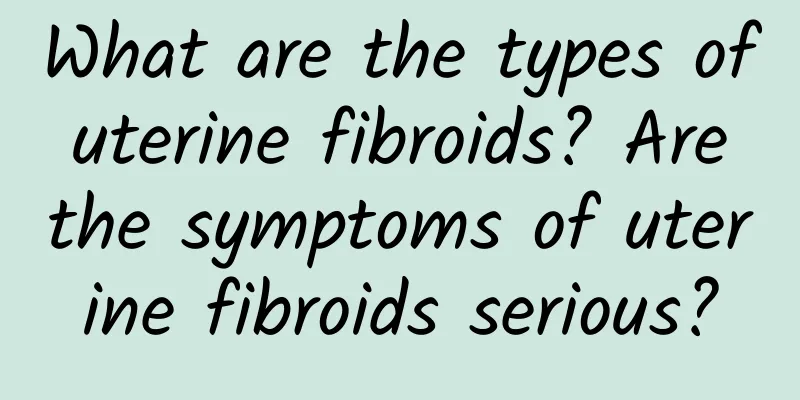What are the types of uterine fibroids? Are the symptoms of uterine fibroids serious?

|
The occurrence of uterine fibroids has always been the most troublesome problem for women, for various diseases. So, what are the symptoms of uterine fibroids, and is the condition serious? Uterine fibroids appear as solid spherical masses with a smooth surface and a harder texture than the myometrium, with a clear boundary from the surrounding muscle tissue. The fibroids compress the surrounding muscle wall fibers to form a pseudocapsule, and there is a loose mesh gap between the fibroids and the pseudocapsule. After cutting the pseudocapsule, the fibroids can protrude on their own. Uterine fibroids mainly depend on the location, size, number and complications of the fibroids. Some fibroids are small, grow slowly, are asymptomatic, and cannot be found throughout life. In recent years, due to the widespread use of B-ultrasound examinations, many patients have found uterine fibroids through B-ultrasound examinations during routine physical examinations. Most patients seek medical treatment due to symptoms. Common symptoms of uterine fibroids include uterine bleeding, abdominal masses, vaginal discharge, compression, etc. There are three symptoms of uterine fibroids: 1. Menstrual changes: When the fibroids continue to grow, the volume of the uterus will also increase accordingly, thus disrupting the normal physiological function of the uterus. Since the growth of the tumor affects the hemostatic function of the uterus during menstruation, it is often manifested as shortened menstrual cycles, increased menstrual volume, prolonged menstruation, irregular vaginal bleeding, etc. If the patient has excessive menstruation for a long time, it may lead to secondary symptoms such as anemia, general fatigue, pale complexion, shortness of breath, palpitations, etc. 2. Abdominal mass: During the growth of uterine fibroids, patients can feel abdominal swelling, and the lower abdominal tumor is large enough to touch, especially in the morning before getting up to urinate. As the bladder is full, the uterus moves upward and is more likely to touch the fibroids. This feeling becomes gradually more obvious as the uterine fibroids grow. 3. Increased leucorrhea: Uterine fibroids can cause pelvic congestion and infection, which in turn leads to increased vaginal flow, which is mixed with traditional leucorrhea to increase secretion. Most leucorrhea is purulent and has a fishy smell. |
<<: Symptoms of uterine fibroids. Will uterine fibroids cause abnormal leucorrhea?
>>: Are the symptoms of uterine fibroids obvious? Can uterine fibroids also cause anemia?
Recommend
Treatment of Hyperprolactinemia with Chinese and Western Medicine
In today's fast-paced work and life, many wom...
Is it safe to have an abortion in a hospital?
Abortion, as the name suggests, means you don'...
Specific clinical symptoms of cervicitis
Cervicitis is a common disease that brings a lot ...
Is it easier to get pregnant if your period is irregular?
Long-term irregular menstruation will indeed make...
Briefly explain: Three common uterine fibroid surgeries
Uterine fibroids are a gynecological disease that...
How to prevent habitual miscarriage?
Because habitual miscarriage is very harmful, it ...
Adele lifts weights to relieve stress and treat anxiety! Become physically and emotionally stronger
British singer Adele, who appeared on the cover o...
These 4 factors can induce bacterial vaginosis and should be taken seriously
The main triggering factors of bacterial vaginosi...
Let's take a look at the classification of women's menstrual disorders
There are different types of irregular menstruati...
When is the best time to have an abortion?
I believe that many friends would think of having...
How much does it cost to treat endometrial hyperplasia?
As our living standards continue to improve, our ...
How to treat cervical warts in the early stage?
Do you know what treatment technologies are avail...
Will a woman die if she has an ectopic pregnancy?
Many women are afraid of suffering from gynecolog...
Various methods of detecting threatened abortion
For female friends, pregnancy is very hard, and t...
Is ectopic pregnancy a genetic disease?
Is ectopic pregnancy a genetic disease? Genetic d...









